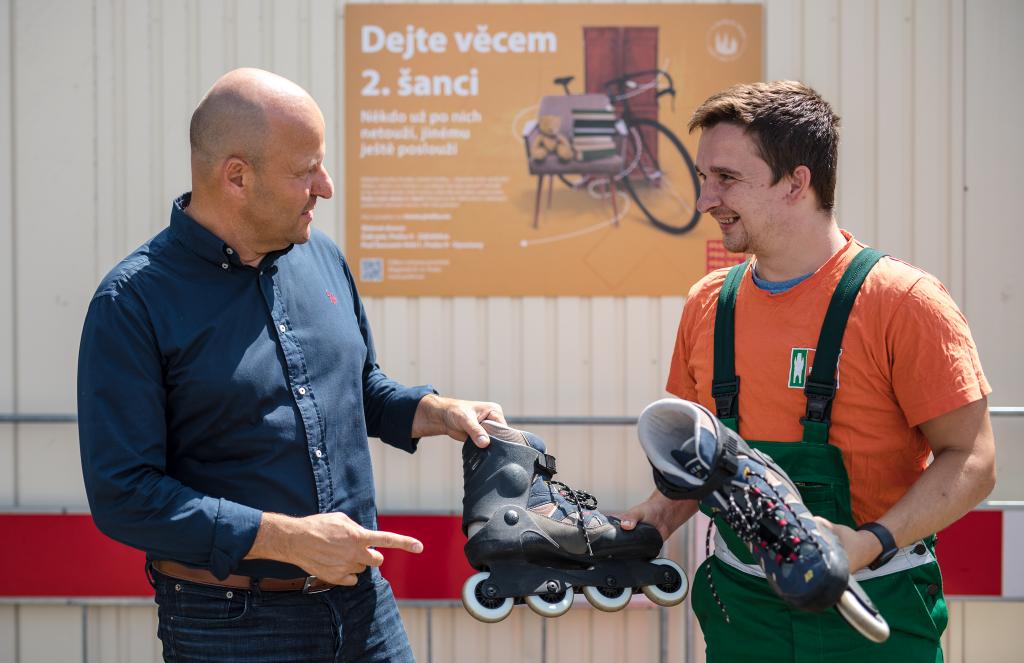Thessaloniki gets ready for its metro launch in November
The underground rapid transit lines have been under construction for almost two decades due to various project delays
 TheMayor.EU logo
TheMayor.EU logo 
Deputy Mayor and Councillor for the Environment Petr Hlubuček at a RE-USE point, Source: City of Prague
The Czech capital plans to expand its current RE-USE project
On Monday 19 July, the City of Prague revealed its wishes to further expand its RE-USE centres project. Centres for the reuse of second-hand items were first established last year with the aim of minimising the generation of waste. With time, the project has proven to be successful as items that would otherwise end up in landfills have been given to others who find them useful.
The RE-USE centres allow citizens to deposit furniture, toys, sports equipment, dishes, books, and other items which no longer serve them. Such objects can typically be used for many years and are often thrown away while they still have their utility value. Therefore, the centres give them a second life and the opportunity to bring joy to other people.
Deposited items are photographed and offered to those in need. First, they are presented to non-profit and charity organisations. If they do not show interest in them, they are then made available to the public for free via the RE-USE website.
Through the RE-USE project, the City of Prague applies the principles of a circular economy as it seeks to prevent the creation of waste and keep products in use. Furthermore, the municipality explains that the transition to a circular economy is one of the four basic preconditions for the achievement of Prague’s climate goals, namely the reduction of CO2 emissions by 45% by 2030.
Commenting on the centres, Deputy Mayor and Councillor for the Environment Petr Hlubuček explained: “Up to 40 percent of the stored furniture in the collection yards can still be fully used. That is why we want to be able to store such furniture in RE-USE points in Prague and to be able to mediate its further use to the widest possible circle of users. It is not just about minimising waste. It is also about the good feeling that the thing we have given money for and enjoyed for years does not just end up somewhere in a landfill.
The example of the second life of furniture is a nice example of how the circular economy looks in practice. We want to give people the opportunity to get second-hand furniture and other household equipment today, or to get rid of it ecologically. We want to offer an alternative to the consumerist way of life to those who are interested.”
Currently, there are 3 RE-USE points where people can deposit items: Zakrýta street in Prague 4, Pod Šancemi street in Prague 9, and Horní Počernice in Prague 20. Thanks to the success of these centres, the capital now seeks to expand the project. For this reason, it has announced its plans to soon launch Swap events where people will be able to exchange items such as household equipment, toys, etc.
If you want to keep up with how European cities and regions are changing, follow us on Facebook, Twitter and Instagram.

The underground rapid transit lines have been under construction for almost two decades due to various project delays

Now you can get your wine in Talence by paying directly in Bitcoin

That’s because the state has to spend money on updating the railway infrastructure rather than subsidizing the cost of the popular pass

Rethinking renewable energy sources for the urban landscape

The examples, compiled by Beyond Fossil Fuels, can inform and inspire communities and entrepreneurs that still feel trepidation at the prospect of energy transition

Now you can get your wine in Talence by paying directly in Bitcoin

The 10th European Conference on Sustainable Cities and Towns (ESCT) sets the stage for stronger cooperation between the EU, national and local level to fast track Europe's transition to climate neutrality.

At least, that’s the promise made by the mayor of Paris, Anne Hidalgo

The underground rapid transit lines have been under construction for almost two decades due to various project delays

At least, that’s the promise made by the mayor of Paris, Anne Hidalgo

Hostal de Pinós is located in the geographical centre of the autonomous region

Despite its church-y name, the district has long been known as the hangout spot for the artsy crowds

Urban dwellers across the EU are having a say in making their surroundings friendlier to people and the environment.

Forests in the EU can help green the European construction industry and bolster a continent-wide push for architectural improvements.

Apply by 10 November and do your part for the transformation of European public spaces

An interview with the Mayor of a Polish city that seeks to reinvent itself

An interview with the newly elected ICLEI President and Mayor of Malmö

A conversation with the Mayor of Lisbon about the spirit and dimensions of innovation present in the Portuguese capital














